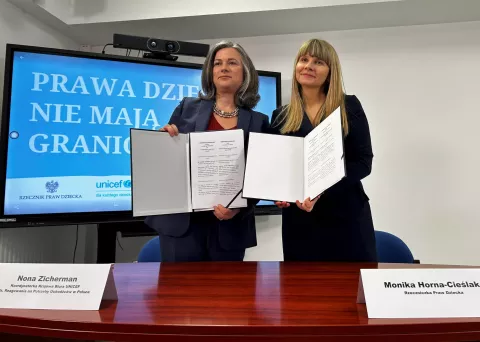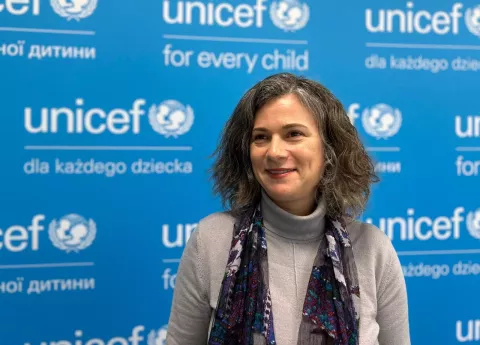"It is cool here, no doubt about it... but home is home."
Exploring the subjective wellbeing of children and adolescents living in Poland in the face of the war in Ukraine

- Available in:
- English
- Polish
Highlights
On World Children’s Day, three international organisations working in the field of child protection in Poland - United Nations Children’s Fund (UNICEF), Plan International and Save the Children - release a research report on the subjective wellbeing of children and adolescents living in Poland in the face of the war in Ukraine. The report is based on children's voices and opinions through pictures taken by them and participatory dialogues.
The consultations were framed around these three themes: the mental health and psychosocial wellbeing of refugee children from Ukraine, their education, and their integration into Polish society. Key findings from the report include:
- Children from Ukraine expressed feelings of nostalgia for the people, pets and places they had left behind.
- Some children and adolescents become apathetic and resort to excessive sleeping and eating when they feel overwhelmed with feelings of stress.
- Over half of the participants from Ukraine said they would like to talk to “someone professional” about their mental health.
- Those who attend a Polish school reported that although they face many challenges such as language barriers and adaptation to a new educational system, going to school provides some routine.
- Studying at an online Ukrainian school was deemed to be very tiring because of the amount of screen time but especially because, according to participants, the classes were not well organised.
- Fewer than half of the participants from Ukraine expressed a desire to stay in Poland.
- Some children from Ukraine reported experiencing discrimination at school, from both teachers and classmates.
- When Polish and Ukrainian participants had sufficient opportunities for deep one-on-one exchanges with others, they recalled positive experiences, getting along together and building friendships.
In response to these challenges, the report recommends concrete and practical steps for national and local authorities in Poland, United Nations agencies, NGOs and civil society organisations. The recommendations are categorised into three key areas:
Mental health and psychosocial wellbeing
- Increase awareness of and access to specialised, free of charge mental health care services for refugee children from Ukraine, e.g., through recruitment of Ukrainian-speaking mental health experts.
- Foster parenting programmes, elevating the capabilities of educators, intercultural assistants, and volunteers.
Education
- Deploy more Ukrainian intercultural assistants in Polish schools and enrich teacher training content with modules on social and cultural cohesion, conflict sensitivity, anti-discrimination practices, and wellbeing.
- Prioritise Polish language classes, remedial support and peer-to-peer mentoring programmes.
- Provide information about education options for children from Ukraine.
Cohesion and participation
- Fund extracurricular activities that enable children from Ukraine, especially those who attend an online school, to build meaningful relationships in Poland.
- Provide anonymous and child friendly feedback mechanisms in schools and child friendly spaces, to ensure that children have opportunities to safely report their concerns.






